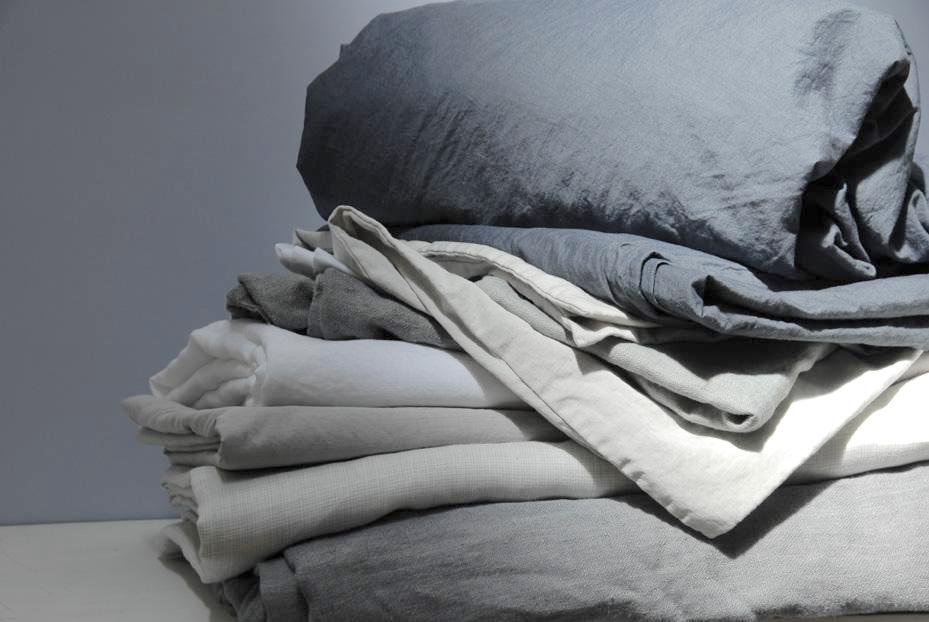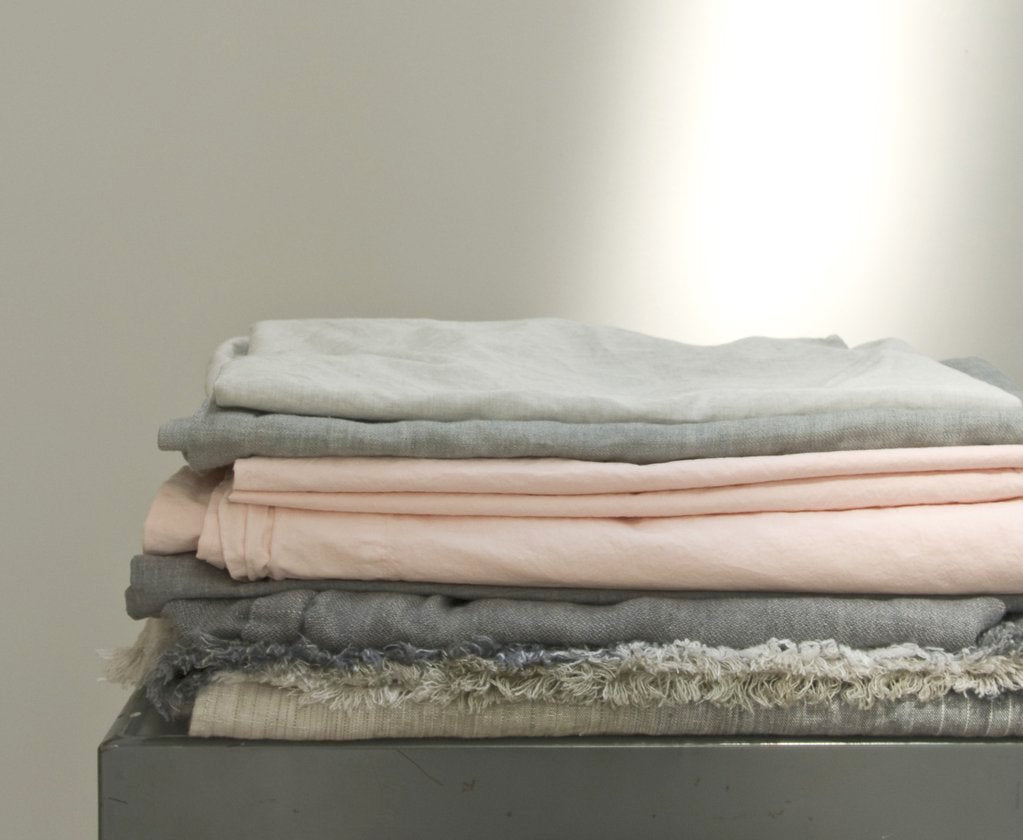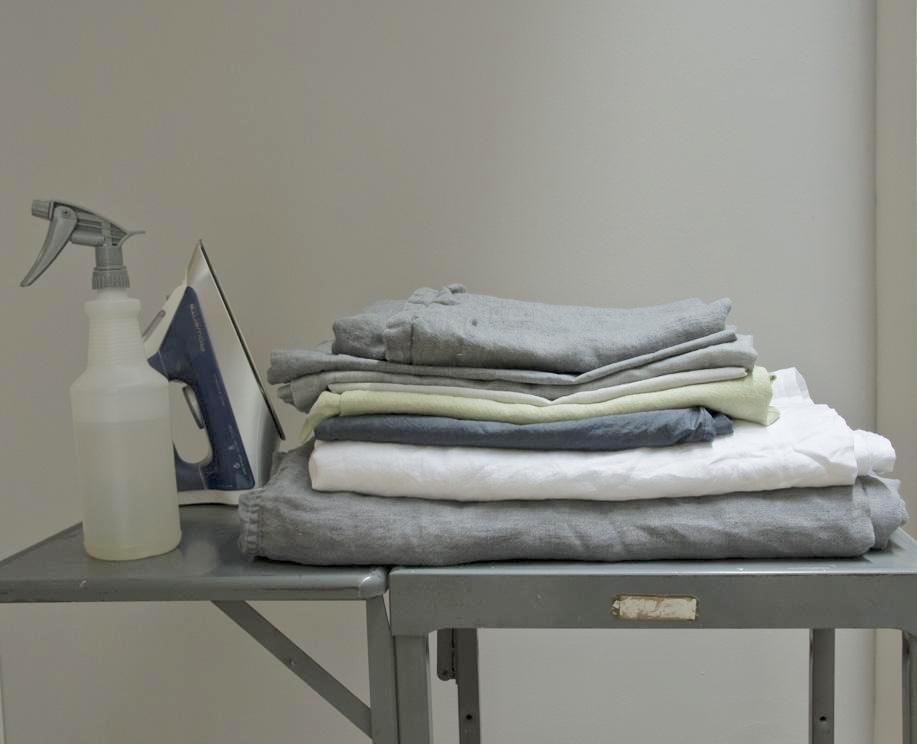AREA bedding lasts a long time, but its life can be extended even more by caring for it correctly.
PREP
The first thing to do is spot clean each item before running it through a wash cycle. Once a stain has been heat set, there is no chance of removing it from the fabric. Oil stains from skin care products are very common on bed linens. The best thing to do is use a de-greasing agent like dish soap with a little water to remove the stain.

SOAP etc
Once you're ready to load the machine, make sure you're not mixing your linens with any clothing that has zippers or sharp metal components that could damage the sheets. It’s best to use a biodegradable detergent as it is gentle, giving your sheets a long life as well as being better for the environment. Dryer sheets and fabric softeners are not necessary and will actually do more harm than good. Fabric softeners work by breaking down fibers, which means the fabric won’t hold up for very long. Dryer sheets attract lint, which will rub against your linens and cause pilling. Never use bleach. Ever.
BLEACH ALTERNATIVES
There are so many reasons why whites and brights may become dingy. The advice above holds: never use bleach. But there are ways to brighten up linens that have been tested by bad laundry machines, mineral-heavy water, as well as oils and sweat. Hydrogen peroxide, lemon juice, baking soda, vinegar, citric acid, even lemon essential oil, all of these can be used in varying combinations to lighten, brighten and freshen up your linens.
Bleach alternative technology has improved over the years and OXOBrite™ can be a good option. It does include sodium percarbonate and sodium carbonate as ingredients so use with caution and always spot test. A homemade solution for homemade oxyclean from Wellness Mama is perhaps a better bet, since it's not only easy to make, but safer to use.
Here is a homemade version of a gentle stain removing spray just in case a little dish soap isn't enough. In a spray bottle, create the following mixture: 1/2 hydrogen peroxide, 1/2 white vinegar, a squeeze of dishwashing liquid (undyed!), and top it off with a little water. Tip upside down a few times to combine. This mixture works well on organic stains of all kinds.
Make sure to do your research, even natural ingredients can create potent chemical reactions.

TEMPERATURE
A good rule of thumb for setting the temperature is dark colors on cold and light colors on warm. These days there is really no need to use hot water since detergents are so powerful. Better to be nicer to the environment and use less heat when possible.

DRYING
Air-drying is always preferred for the life span of your linens, but often that is not an option. Here in NYC, it’s a bit difficult to air-dry our sheets, so we’ve had to make do with the dryer. Linen sheets can feel stiff when air dried but get softer with a steamy ironing or in the actual dryer. Linen dries three times faster than cotton, so make sure to keep your dryer on its lowest heat setting. Most important is to never use a hot dryer. Dry on delicate or low-medium heat and not for too long, sheets should come out before they are over dry. This is very important as over drying will cause wrinkles as well as break down the fibers over time (especially important for linen that gets stiffer and more wrinkled if over dried). If the dryer is too full fabric will dry unevenly, so better to split into batches rather than stuffing the dryer full. Cleaning the lint filter is a must, if lint is still present it can get caught on the fibers and create pilling on more delicate surfaces or on soft cotton blankets.
Take out your sheets when they are still just damp and lay them out on a drying rack or the bed. Once the sheets are totally dry stretch out your linens and fold neatly. This is best done with another person, you will be amazed at how effective stretching the fabric taught will be for linen’s tendency to wrinkle. You won’t need to iron one bit.

IRONING
Ironing is not necessary but it will soften linen and can be quite therapeutic once you get into the rhythm. If you don’t have the time but still want a more polished look, just iron the pillow cases.
WOOL
The best way to keep wool and other blankets fresh is to air them out outside or in an open window. If this is done frequently, washing won't be needed too often. Wool can safely be washed by hand in low temperatures. Rinse well, squeeze out excess water and dry flat. Pressing with a hot iron and a damp cloth between the iron and your wool can make it look like new.
PILLOWS
Pillow inserts can be protected by doubling your pillow cases or using a pillow protector case. This really helps in keeping the pillows fresh longer.
If you'd like to learn more, read this article by Remodelista where they asked Anki Spets' for her quintessential tips on caring for linens.
We are always happy to answer any questions in person in our stores or to give you tips over email. Don't hesitate to contact us.
- AREA


